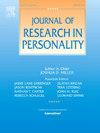个人相对贫困与道德自我判断:控制感的调节作用
IF 2.6
2区 心理学
Q2 PSYCHOLOGY, SOCIAL
引用次数: 0
摘要
六项研究(有效样本总数 = 1835)考察了个人相对剥夺感对自身不道德行为道德判断的影响,以及控制感的调节作用。研究发现,相对剥夺感高(与相对剥夺感低)的人更倾向于对自己的各种想象中的违法行为认可宽松的道德标准。此外,研究 4-6 还提供了证据,证明控制感在相对剥夺感与自身道德过失的可接受性之间具有积极的调节作用。这些研究结果表明,个体,尤其是控制感强的个体,可能会为自己的不道德行为辩解,以弥补相对剥夺感带来的伤害。本文章由计算机程序翻译,如有差异,请以英文原文为准。
Personal relative deprivation and moral self-judgments: The moderating role of sense of control
Six studies (total valid N = 1835) examined the impact of personal relative deprivation on moral judgments of one’s own unethical behavior and the moderating role of sense of control. It was found that individuals high (vs. low) on relative deprivation were more likely to endorse lenient moral standards for themselves regarding various imagined transgressions. Moreover, Studies 4–6 also provided evidence for a positive moderation effect of sense of control in the relationship between relative deprivation and the acceptability of one’s own moral transgressions. These findings suggest that individuals, especially those with a high sense of control, may justify their immoral actions to compensate for the hurt feelings of relative deprivation.
求助全文
通过发布文献求助,成功后即可免费获取论文全文。
去求助
来源期刊

Journal of Research in Personality
PSYCHOLOGY, SOCIAL-
CiteScore
5.40
自引率
6.10%
发文量
102
审稿时长
67 days
期刊介绍:
Emphasizing experimental and descriptive research, the Journal of Research in Personality presents articles that examine important issues in the field of personality and in related fields basic to the understanding of personality. The subject matter includes treatments of genetic, physiological, motivational, learning, perceptual, cognitive, and social processes of both normal and abnormal kinds in human and animal subjects. Features: • Papers that present integrated sets of studies that address significant theoretical issues relating to personality. • Theoretical papers and critical reviews of current experimental and methodological interest. • Single, well-designed studies of an innovative nature. • Brief reports, including replication or null result studies of previously reported findings, or a well-designed studies addressing questions of limited scope.
 求助内容:
求助内容: 应助结果提醒方式:
应助结果提醒方式:


